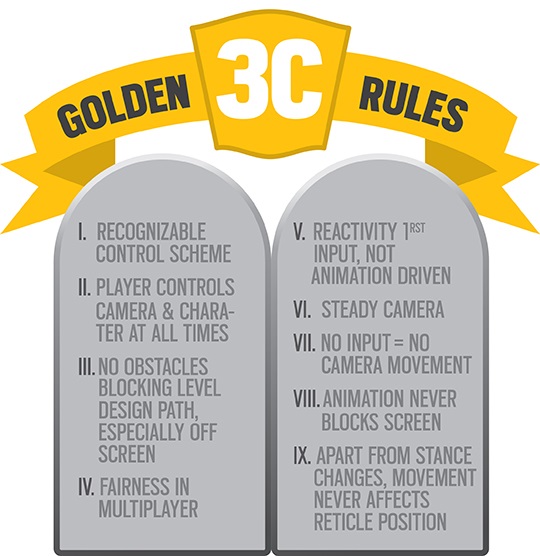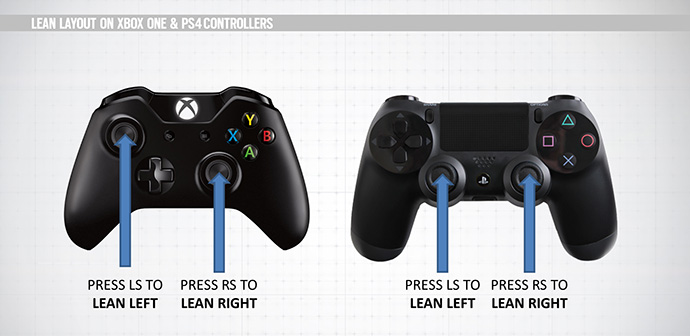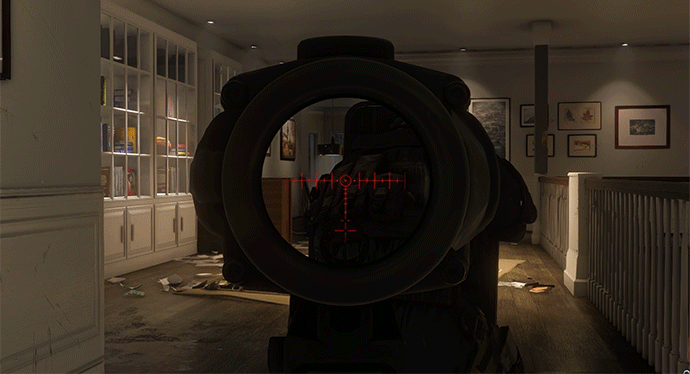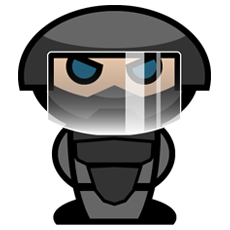Adapting the Cover System for a Dynamic Environment
[“Behind the Wall” is a regular content series that explores various aspects of Rainbow Six Siege, based on the first demo shown. All design and content presented in these articles is a work in progress, and subject to change between now and the final release of the game.]
A split second is all that it takes for everything to go completely haywire and find yourself on the losing end of a bullet. Rainbow Six Siege is highly lethal, and whether you’re on attack or defense, positioning yourself in effective cover is paramount to success. Counter-terrorist units act precisely with total control of their movements, and we’ve established some design principles to capture that feeling, give you freedom of movement and room for experimentation, plus expand your tactical options while utilizing cover.
This “always in control” philosophy led us to establish “Golden Rules”, that we applied to the 3Cs, which refer to Character, Control and Camera. More specifically they define the capabilities of your character, how you control those capabilities, and the camera for how to visualize them. They’re the backbone of player interaction because pretty much everything you do with your avatar is defined by them.

Our Golden 3C Rules
Enforcing these rules results in something that is fully input driven, meaning you have total control of what is happening on the screen at all times. You’ll never be stuck in a contextual cinematic animation where you’re at the mercy of whatever the game is making you do. For example, finding yourself locked at an awkward angle while taking cover, or loss of reactivity while performing an extended melee action. Always being able to aim and shoot is a design priority, and every action you might do which would need both of your hands to be accomplished (like putting a breach charge on a floor), can be cancelled in a blink of an eye, giving you back your ability to shoot instantly.
“Because lethality is so high in Siege, every little thing counts and we never wanted the player to die because of something the game did.” explains Gunther Galipot, user experience director and author of the Golden Rules.

Input Driven / Reactivity first
This input driven philosophy pushed our 3C department to design a new dynamic covering system, something smooth tailored to adapt with the dynamic environment of Siege. To create it, we implemented a free lean system where you’re able to lean left or right, in any stance at any moment while in ADS (Aim Down Sight) or holding a grenade. This freedom also applies to movement, giving you the capability to do things like lean into a strafe, pivoting around a corner. In doing so, cover becomes more than just a feature, it becomes a core part of the entire experience.
You‘re able to cover based on line of sight from any distance, not just when you’re close to a wall. We’ve designed the controls so that it should become second nature (and your first point of action) when making your move to attack from angles, peeking around corners and popping off shots.

In Siege leaning becomes a second nature. PC players will be able to map inputs to their liking.
Remember that almost every surface or component of the environment is realistically destructible. Hiding behind the overturned table in the house isn’t going to save you if the enemy starts pumping bullets through it, and a wall or ceiling could come down at any moment and catch you off guard.
The free lean system gives you total control over your line of sight, and you’ll use it to play dangerous games of cat and mouse with your opponents to get the jump on them. This is representative of the reality of CTU movements and actions while in the field, and we want you to live that while playing the game.
“If you don’t control every line of sight then a bullet can come out from anywhere. You want to control your physical exposure and maximizing your own lethality. This is what the leaning is all about”
“If you don’t control every line of sight then a bullet can come out from anywhere. You want to control your physical exposure and maximize your own lethality. This is what leaning is all about,” emphasizes Galipot.
The input driven golden rule extends to a variety of situations that should give you an immense amount of room to experiment with different lines of sight. For one example, while rappelling you will still be able to aim, shoot, reload or throw a grenade. Now imagine rappelling down the side of a building in the Aussie stance (as explained in the Tools of Attack article), positioning yourself to the left or right of a window, and using the free lean to peek inside and take out a defender while upside down.
“There are so many cover options,” says game designer Andrew Witts. “Go prone and then lean from prone to get a shot off from the floor. Or you could crouch behind a deployable shield and lean to the side, or pop up to a standing position and shoot before coming back down. You could have three people behind that shield all covering different angles. Hell, you could even have three guys in each of the different stances leaning around a corner, stacked up like they were the Three Stooges.”

The Three (extremely deadly) Stooges
Again, those are just a few different ideas to jump start your creativity. All the nuances made available in this system gives you a wide spectrum to experiment with and master over time. Witts even gives some examples of how the freedom of this system can be extrapolated into developing a variety of team tactics. The point man carrying a heavy ballistic shield is another example of a launch point for creating effective team tactics. Your team sends the point man into the room first while the rest of you line up behind each, each taking a different lean angle to storm into an area like a terrifyingly deadly Roman phalanx.

Leaning behind the point man is a viable tactic for storming rooms
Something to keep in mind while experimenting with different approaches to cover and team tactics is that while you reduce the overall surface area an opponent has to hit, you leave the most sensitive part of your body vulnerable. Whether it’s a pistol round or something heavier, a headshot is a headshot and one bullet will take you down for the round.
With all of this in mind, the ultimate goal of our Golden Rules is to not only give you complete control over your actions and freedom to create strategies, but implement in a way that feels natural and fluid. You’ve got plenty to think about when it comes to your strategy and what the other team is doing, you shouldn’t ever have to deal with something in the environment interfering, camera movement throwing you off, or thinking too much about control mechanics. Instead, you’ll be able to focus on how you position yourself, what maneuvers you’ll pull off and be given the space to react quickly when the proverbial s*** goes down. Because it will, and you’re going to need it.
- What kind of maneuvers do you imagine using with this system in mind?
- How many of you will try to get an upside down rappel kill shot when the game comes out?
- Which of the Golden Rules is most interesting to you?
[](https://www.reddit.com/r/rainbow6)

Chase “Electr1cPanda” Straight - Community Developer, Ubisoft Montreal
Chase is a goofy American ex-pat living in Canada who loves music, DJing, blogging, and obviously gaming for hours. No discrimination here, Chase loves consoles as much as playing on his homebuilt gaming rig. Say hi and send cat pics (bonus points if they're wearing R6 gear) on Twitter at @R6ComDevs.

Genevieve "Livinpink" Forget - Community Developer, Ubisoft Montreal
Gen goes by the handle Livinpink in the gaming industry. She is known for her involvement in multiple competitive gaming communities through her work as eSports media and personality. She participates in weekly livestreamed Dungeons and Dragons sessions. She also tweets from @R6ComDevs.











